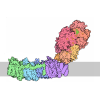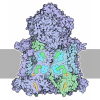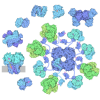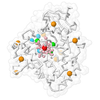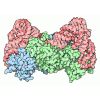[English] 日本語
 Yorodumi
Yorodumi- PDB-7xk6: Cryo-EM structure of Na+-pumping NADH-ubiquinone oxidoreductase f... -
+ Open data
Open data
- Basic information
Basic information
| Entry | Database: PDB / ID: 7xk6 | ||||||||||||||||||
|---|---|---|---|---|---|---|---|---|---|---|---|---|---|---|---|---|---|---|---|
| Title | Cryo-EM structure of Na+-pumping NADH-ubiquinone oxidoreductase from Vibrio cholerae, with aurachin D-42 | ||||||||||||||||||
 Components Components | (Na(+)-translocating NADH-quinone reductase subunit ...) x 6 | ||||||||||||||||||
 Keywords Keywords | TRANSLOCASE / NADH-quinone oxidoreductase / redox-driven sodium pump / bioenergetics / Vibrio cholerae / electron transport / membrane protein complex / OXIDOREDUCTASE | ||||||||||||||||||
| Function / homology |  Function and homology information Function and homology informationriboflavin binding / NADH:ubiquinone reductase (Na+-transporting) / Gram-negative-bacterium-type cell wall / oxidoreductase activity, acting on NAD(P)H, quinone or similar compound as acceptor / sodium ion transport / FAD binding / respiratory electron transport chain / transmembrane transport / 2 iron, 2 sulfur cluster binding / FMN binding ...riboflavin binding / NADH:ubiquinone reductase (Na+-transporting) / Gram-negative-bacterium-type cell wall / oxidoreductase activity, acting on NAD(P)H, quinone or similar compound as acceptor / sodium ion transport / FAD binding / respiratory electron transport chain / transmembrane transport / 2 iron, 2 sulfur cluster binding / FMN binding / electron transfer activity / metal ion binding / plasma membrane Similarity search - Function | ||||||||||||||||||
| Biological species |  Vibrio cholerae O395 (bacteria) Vibrio cholerae O395 (bacteria) | ||||||||||||||||||
| Method | ELECTRON MICROSCOPY / single particle reconstruction / cryo EM / Resolution: 3 Å | ||||||||||||||||||
 Authors Authors | Kishikawa, J. / Ishikawa, M. / Masuya, T. / Murai, M. / Barquera, B. / Miyoshi, H. | ||||||||||||||||||
| Funding support |  Japan, Japan,  United States, 5items United States, 5items
| ||||||||||||||||||
 Citation Citation |  Journal: Nat Commun / Year: 2022 Journal: Nat Commun / Year: 2022Title: Cryo-EM structures of Na-pumping NADH-ubiquinone oxidoreductase from Vibrio cholerae. Authors: Jun-Ichi Kishikawa / Moe Ishikawa / Takahiro Masuya / Masatoshi Murai / Yuki Kitazumi / Nicole L Butler / Takayuki Kato / Blanca Barquera / Hideto Miyoshi /   Abstract: The Na-pumping NADH-ubiquinone oxidoreductase (Na-NQR) couples electron transfer from NADH to ubiquinone with Na-pumping, generating an electrochemical Na gradient that is essential for energy- ...The Na-pumping NADH-ubiquinone oxidoreductase (Na-NQR) couples electron transfer from NADH to ubiquinone with Na-pumping, generating an electrochemical Na gradient that is essential for energy-consuming reactions in bacteria. Since Na-NQR is exclusively found in prokaryotes, it is a promising target for highly selective antibiotics. However, the molecular mechanism of inhibition is not well-understood for lack of the atomic structural information about an inhibitor-bound state. Here we present cryo-electron microscopy structures of Na-NQR from Vibrio cholerae with or without a bound inhibitor at 2.5- to 3.1-Å resolution. The structures reveal the arrangement of all six redox cofactors including a herein identified 2Fe-2S cluster located between the NqrD and NqrE subunits. A large part of the hydrophilic NqrF is barely visible in the density map, suggesting a high degree of flexibility. This flexibility may be responsible to reducing the long distance between the 2Fe-2S centers in NqrF and NqrD/E. Two different types of specific inhibitors bind to the N-terminal region of NqrB, which is disordered in the absence of inhibitors. The present study provides a foundation for understanding the function of Na-NQR and the binding manner of specific inhibitors. | ||||||||||||||||||
| History |
|
- Structure visualization
Structure visualization
| Structure viewer | Molecule:  Molmil Molmil Jmol/JSmol Jmol/JSmol |
|---|
- Downloads & links
Downloads & links
- Download
Download
| PDBx/mmCIF format |  7xk6.cif.gz 7xk6.cif.gz | 338.2 KB | Display |  PDBx/mmCIF format PDBx/mmCIF format |
|---|---|---|---|---|
| PDB format |  pdb7xk6.ent.gz pdb7xk6.ent.gz | 276.5 KB | Display |  PDB format PDB format |
| PDBx/mmJSON format |  7xk6.json.gz 7xk6.json.gz | Tree view |  PDBx/mmJSON format PDBx/mmJSON format | |
| Others |  Other downloads Other downloads |
-Validation report
| Arichive directory |  https://data.pdbj.org/pub/pdb/validation_reports/xk/7xk6 https://data.pdbj.org/pub/pdb/validation_reports/xk/7xk6 ftp://data.pdbj.org/pub/pdb/validation_reports/xk/7xk6 ftp://data.pdbj.org/pub/pdb/validation_reports/xk/7xk6 | HTTPS FTP |
|---|
-Related structure data
| Related structure data |  33245MC  7xk3C  7xk4C  7xk5C  7xk7C M: map data used to model this data C: citing same article ( |
|---|---|
| Similar structure data | Similarity search - Function & homology  F&H Search F&H Search |
- Links
Links
- Assembly
Assembly
| Deposited unit | 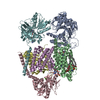
|
|---|---|
| 1 |
|
- Components
Components
-Na(+)-translocating NADH-quinone reductase subunit ... , 6 types, 6 molecules ABCDEF
| #1: Protein | Mass: 48680.734 Da / Num. of mol.: 1 Source method: isolated from a genetically manipulated source Source: (gene. exp.)  Vibrio cholerae O395 (bacteria) / Gene: nqrA, VC0395_A1884, VC395_2411 / Production host: Vibrio cholerae O395 (bacteria) / Gene: nqrA, VC0395_A1884, VC395_2411 / Production host:  References: UniProt: A5F5X1, NADH:ubiquinone reductase (Na+-transporting) |
|---|---|
| #2: Protein | Mass: 45390.883 Da / Num. of mol.: 1 Source method: isolated from a genetically manipulated source Source: (gene. exp.)  Vibrio cholerae O395 (bacteria) / Gene: nqrB, VC0395_A1883, VC395_2410 / Production host: Vibrio cholerae O395 (bacteria) / Gene: nqrB, VC0395_A1883, VC395_2410 / Production host:  References: UniProt: A5F5X0, NADH:ubiquinone reductase (Na+-transporting) |
| #3: Protein | Mass: 27652.270 Da / Num. of mol.: 1 Source method: isolated from a genetically manipulated source Source: (gene. exp.)  Vibrio cholerae O395 (bacteria) / Gene: nqrC, VC0395_A1882, VC395_2409 / Production host: Vibrio cholerae O395 (bacteria) / Gene: nqrC, VC0395_A1882, VC395_2409 / Production host:  References: UniProt: A5F5Y7, NADH:ubiquinone reductase (Na+-transporting) |
| #4: Protein | Mass: 22853.217 Da / Num. of mol.: 1 Source method: isolated from a genetically manipulated source Source: (gene. exp.)  Vibrio cholerae O395 (bacteria) / Gene: nqrD, VC0395_A1881, VC395_2408 / Production host: Vibrio cholerae O395 (bacteria) / Gene: nqrD, VC0395_A1881, VC395_2408 / Production host:  References: UniProt: A5F5Y6, NADH:ubiquinone reductase (Na+-transporting) |
| #5: Protein | Mass: 21481.678 Da / Num. of mol.: 1 Source method: isolated from a genetically manipulated source Source: (gene. exp.)  Vibrio cholerae O395 (bacteria) / Gene: nqrE, VC0395_A1880, VC395_2407 / Production host: Vibrio cholerae O395 (bacteria) / Gene: nqrE, VC0395_A1880, VC395_2407 / Production host:  References: UniProt: A5F5Y5, NADH:ubiquinone reductase (Na+-transporting) |
| #6: Protein | Mass: 45942.363 Da / Num. of mol.: 1 Source method: isolated from a genetically manipulated source Source: (gene. exp.)  Vibrio cholerae O395 (bacteria) / Gene: nqrF, VC0395_A1879, VC395_2406 / Production host: Vibrio cholerae O395 (bacteria) / Gene: nqrF, VC0395_A1879, VC395_2406 / Production host:  References: UniProt: A5F5Y4, NADH:ubiquinone reductase (Na+-transporting) |
-Sugars , 1 types, 2 molecules 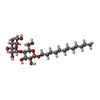
| #11: Sugar |
|---|
-Non-polymers , 8 types, 59 molecules 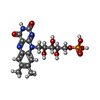
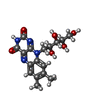

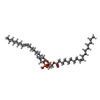

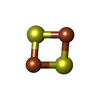
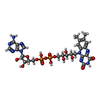








| #7: Chemical | | #8: Chemical | ChemComp-RBF / | #9: Chemical | ChemComp-0NI / | #10: Chemical | #12: Chemical | ChemComp-CA / | #13: Chemical | #14: Chemical | ChemComp-FAD / | #15: Water | ChemComp-HOH / | |
|---|
-Details
| Has ligand of interest | Y |
|---|
-Experimental details
-Experiment
| Experiment | Method: ELECTRON MICROSCOPY |
|---|---|
| EM experiment | Aggregation state: PARTICLE / 3D reconstruction method: single particle reconstruction |
- Sample preparation
Sample preparation
| Component | Name: Na+-pumping NADH-ubiquinone oxidoreductase from Vibrio cholerae, with aurachin D-42 Type: COMPLEX / Entity ID: #1-#6 / Source: RECOMBINANT | ||||||||||||||||||||
|---|---|---|---|---|---|---|---|---|---|---|---|---|---|---|---|---|---|---|---|---|---|
| Molecular weight | Value: 0.22 MDa / Experimental value: YES | ||||||||||||||||||||
| Source (natural) | Organism:  Vibrio cholerae O395 (bacteria) Vibrio cholerae O395 (bacteria) | ||||||||||||||||||||
| Source (recombinant) | Organism:  | ||||||||||||||||||||
| Buffer solution | pH: 8 | ||||||||||||||||||||
| Buffer component |
| ||||||||||||||||||||
| Specimen | Conc.: 11 mg/ml / Embedding applied: NO / Shadowing applied: NO / Staining applied: NO / Vitrification applied: YES | ||||||||||||||||||||
| Vitrification | Instrument: FEI VITROBOT MARK IV / Cryogen name: ETHANE / Humidity: 100 % / Chamber temperature: 277 K |
- Electron microscopy imaging
Electron microscopy imaging
| Experimental equipment |  Model: Titan Krios / Image courtesy: FEI Company |
|---|---|
| Microscopy | Model: FEI TITAN KRIOS |
| Electron gun | Electron source:  FIELD EMISSION GUN / Accelerating voltage: 300 kV / Illumination mode: FLOOD BEAM FIELD EMISSION GUN / Accelerating voltage: 300 kV / Illumination mode: FLOOD BEAM |
| Electron lens | Mode: BRIGHT FIELD / Nominal magnification: 81000 X / Nominal defocus max: 2000 nm / Nominal defocus min: 800 nm / Cs: 0.092 mm |
| Specimen holder | Cryogen: NITROGEN / Specimen holder model: FEI TITAN KRIOS AUTOGRID HOLDER |
| Image recording | Average exposure time: 6.5 sec. / Electron dose: 65 e/Å2 / Film or detector model: GATAN K3 BIOQUANTUM (6k x 4k) / Num. of grids imaged: 1 / Num. of real images: 11430 |
| EM imaging optics | Energyfilter name: GIF Bioquantum / Energyfilter slit width: 20 eV |
- Processing
Processing
| Software | Name: PHENIX / Classification: refinement | ||||||||||||||||||||||||||||||||||||
|---|---|---|---|---|---|---|---|---|---|---|---|---|---|---|---|---|---|---|---|---|---|---|---|---|---|---|---|---|---|---|---|---|---|---|---|---|---|
| EM software |
| ||||||||||||||||||||||||||||||||||||
| CTF correction | Type: PHASE FLIPPING AND AMPLITUDE CORRECTION | ||||||||||||||||||||||||||||||||||||
| Particle selection | Num. of particles selected: 299013 | ||||||||||||||||||||||||||||||||||||
| Symmetry | Point symmetry: C1 (asymmetric) | ||||||||||||||||||||||||||||||||||||
| 3D reconstruction | Resolution: 3 Å / Resolution method: FSC 0.143 CUT-OFF / Num. of particles: 54284 / Algorithm: FOURIER SPACE / Symmetry type: POINT | ||||||||||||||||||||||||||||||||||||
| Atomic model building | Protocol: OTHER / Space: REAL | ||||||||||||||||||||||||||||||||||||
| Atomic model building | PDB-ID: 4P6V 4p6v | ||||||||||||||||||||||||||||||||||||
| Refine LS restraints |
|
 Movie
Movie Controller
Controller






 PDBj
PDBj
